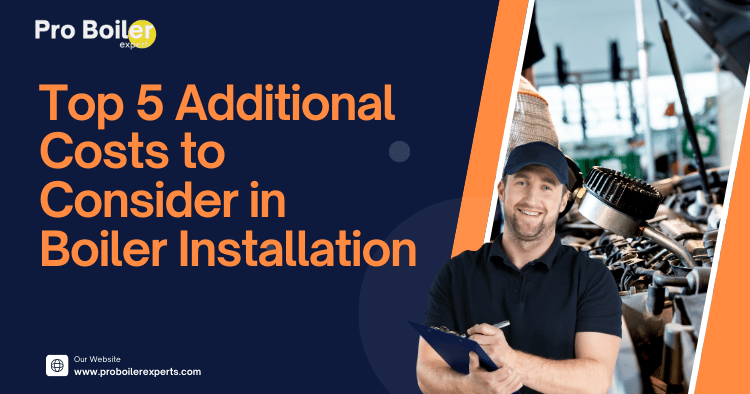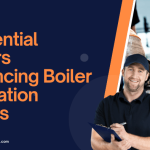Table of Contents
- Introduction
- 1. Boiler Type and Size
- 2. Installation Labor Costs
- 3. Additional Equipment and Accessories
- 4. Permits and Inspections
- 5. Ongoing Maintenance Costs
- Conclusion
- FAQs
Introduction
Installing a boiler is a significant investment that goes beyond the purchase price of the unit itself. Understanding the additional costs involved can help you budget more accurately and avoid any surprises down the line. In this article, we’ll explore the top five additional costs to consider when installing a boiler, ensuring you’re well-prepared for this important home upgrade.
1. Boiler Type and Size
Choosing the right boiler type and size is crucial for both efficiency and cost. Boilers come in various types—combi, system, and regular—each with different price points and installation requirements. Recent trends indicate a growing preference for high-efficiency and eco-friendly options in 2024, including condensing and biomass boilers.
| Boiler Type | Description | Average Cost |
|---|---|---|
| Combi | Instant hot water and heating | $1,500 – $4,000 |
| System | Requires a hot water cylinder but no tank | $1,800 – $4,500 |
| Regular | Requires both a hot water cylinder and a cold water tank | $1,900 – $5,000 |
The size of the boiler is also essential; a unit that is too small will struggle to heat your home, while an oversized boiler may lead to higher energy costs. Consulting a heating engineer for a heat loss calculation can help determine the right size for your home.
Pro Tip: Consider energy efficiency ratings, as higher-rated boilers may cost more upfront but save you money on energy bills in the long run. For more insights, check out our article on Top 5 Benefits of High-Efficiency Boilers for Optimal Home Comfort.
2. Installation Labor Costs
Labor costs can vary significantly based on your location, the complexity of the installation, and the experience of the technicians. On average, you can expect to pay between $500 and $1,500 for installation labor.
Factors that may influence labor costs include:
- Location: Urban areas often have higher labor rates.
- Installation Complexity: Retrofits or complex installations can require more labor.
- Experience of Installers: Hiring a certified installer may come at a premium, but it ensures quality work.
Visual Aid: A simple cost breakdown for labor in different regions can help illustrate this variance.
| Region | Average Labor Cost |
|---|---|
| Urban Area | $1,000 – $1,500 |
| Suburban | $600 – $1,000 |
| Rural | $500 – $800 |
3. Additional Equipment and Accessories
When installing a new boiler, you may need additional equipment or accessories that can add to your overall cost. Common accessories include:
- Thermostats: Smart thermostats can optimize energy use but may cost between $100 and $300.
- Flues and Vents: Upgrading flue pipes or vents may add $200 to $600 to your total.
- Water Softener: If you have hard water, a water softener can prevent scaling and prolong boiler life, costing around $500 to $1,500.
It’s essential to discuss these potential additions with your installer to get a comprehensive quote. For more details on smart heating solutions, see our article on Top 5 Smart Boilers Revolutionizing Home Heating in 2024.
4. Permits and Inspections
In many areas, installing a boiler requires permits and inspections to ensure compliance with local codes and safety regulations. These can range from $100 to $500, depending on your location and the complexity of the project.
Be sure to:
- Check Local Regulations: Contact your local building authority to understand what’s required.
- Ensure Compliance: Proper permits help avoid fines and ensure safety.
Reminder: Hiring a certified installer may simplify this process, as they often handle permits and inspections on your behalf. For a comprehensive view of the installation process, refer to our article on Essential Permits for Boiler Installation Process.
5. Ongoing Maintenance Costs
Once installed, your boiler will require regular maintenance to operate efficiently and safely. Annual servicing typically costs between $150 and $300. Regular maintenance not only extends the life of your boiler but also keeps it running at peak efficiency, saving you money on energy bills.
Consider these maintenance components:
- Annual Servicing: Checkups by a qualified technician.
- Repairs: Unexpected issues can arise, leading to repair costs averaging $150 to $1,000 depending on the problem.
- Replacement Parts: Budget for occasional replacements such as pumps or valves.
Pro Tip: Many installers offer service plans that can help you budget for maintenance costs over time. For insights on maintaining specific boiler types, check out our article on Top 5 Benefits of Choosing Combi Boilers for Your Home.
Conclusion
Installing a boiler is a significant investment, and understanding the additional costs can help you prepare and budget effectively. By considering boiler type and size, installation labor costs, additional equipment, permits, and ongoing maintenance, you can make informed decisions that will benefit your home and wallet in the long run.
FAQs
1. How much does a boiler installation typically cost in total?
A complete boiler installation can range from $3,000 to $7,500 or more, depending on the factors discussed above.
2. Can I install a boiler myself?
While it may be tempting to save on labor costs, it’s best to hire a qualified professional to ensure safety and compliance with local regulations.
3. What are the signs that my boiler needs maintenance?
Common signs include strange noises, fluctuating temperatures, or an increase in energy bills. If you notice any of these, it’s time to schedule a maintenance check.
4. Are there financing options available for boiler installation?
Many contractors offer financing plans or payment options to help spread out the cost over time. Be sure to ask about these options when getting quotes.
5. Where can I find more information on boiler types and costs?
For more information, you can visit Energy.gov or the U.S. Department of Energy for detailed guides and resources on heating systems.
By understanding these additional costs, you’ll be better equipped to make informed decisions about your boiler installation. Happy heating!




